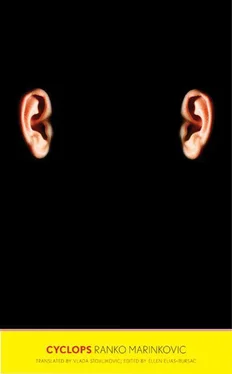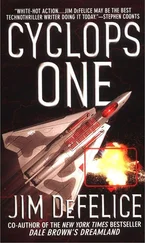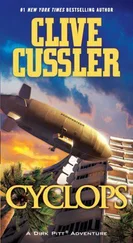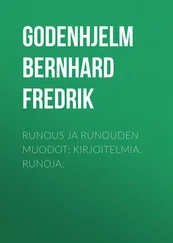The aroma of the coffee brought Melkior back to the real presence of things. He heard the oil stove hissing; he heard something about a skeleton, too. Who knows if Dom Kuzma is still among us? Ask Ugo, his mother might know … Well, what’s it to me even if he is …? Hey, let him live … until Polyphemus the beast grabs ahold of the whole Earth …
“That goes for all of us nowadays … everyone’s dragging some sort of skeleton around,” said Melkior.
“Easy for you, youthful Eustachius, to speak in metaphors. But my dead man is no poetic image. Oh …” Maestro was about to exclaim, but suddenly changed his mind and beckoned Melkior to get up, “follow me, faithful Eustachius. Dante called Virgil ‘Maestro,’ too.”
He led Melkior to a small balcony “which looked out (Melkior was composing a description and chuckling at the way the balcony was ‘looking out’) over the empty outlying fields sunk into the dense wet night.” The freshness of the moist air caressed his cheeks; he inhaled deeply the smell of wet soil. From away in the darkness came the barking of dogs, and from somewhere near by, a strange buzzing sound, as if a mechanism were finely grinding the silence.
“Can you hear that, quiet Eustachius?” whispered Maestro in a kind of fear. His voice was trembling, but that could be merely due to his being drunk and chilled, thought Melkior. “Can you hear the zzeee … zzeee … zzeee … the villain’s sinister meditation! You’d say it was the night, speaking with the many voices of Nature … crickets, cicadas … but that’s not what it is, Eustachius, listen carefully. I listen to it night after night … It’s praying to the devil, its master … or, if there is no devil, it is praying to the stupid Power that shakes it — that’s why it’s buzzing so. Like a sinner set to trembling by God acting in him …”
Maestro was shaking all over with a kind of horror; the shakes broke his voice every now and then.
“Whatever are you talking about?” The terror moved over to Melkior. “Can’t you see its claws and tendrils? Look over there, in the distance.” Maestro was pointing a shaking hand into the dark. “Over there, over there, can’t you see the stripes scoring the sky, that’s its trail. It leads to the … country from whose bourn no traveler returns, as the Prince of Denmark once said.”
Only then did Melkior see it: quite near and level with Maestro’s balcony, perhaps only three or four meters away, was a transmission line. The black cords of thick, powerful cables boldly sliced the darkness. And the buzzing sound was coming from the pylon jutting up nearby, as tall as the building. Lightning must strike there often, thought Melkior.
“So what is there for you to be afraid of?” he said to Maestro as he would to a child, “it’s an electrical cable.”
“A po-wer ca-ble,” emphasized Maestro, “ ‘high voltage, danger of death.’ Down at the bottom of the pylon there’s a skull and crossbones as well, a courteous warning: don’t play with this. Then again, it could serve as an enticement. Imagine a shepherd, for instance. … Could it be that you’re cold, tender Eustachius? (he himself was trembling like a leaf), let’s go back in, Eustachius, let’s go back in. So the shepherd is up on a mountain, a sodomite, a dolt, living among the lightning bolts, and out of boredom he shimmies up the pylon to grab that porcelain cup, possibly to bring it as a vandal’s trophy back to his village. Or just to spite the warning, displaying some preposterous form of heroism, think I’m scared of you? — and there he is up top, a fried imbecile, his abandoned sheep bleating down below. A folk fool.”
“Why ‘folk’?” protested Melkior without enthusiasm, “a fool, an individual fool.”
“Oh no, dear Eustachius, a folk fool. An individual fool is Fred die for one … and let’s say Ugo, too. Or … let’s not say Ugo, he’s more of a nut case, a concept which has some charm to it. But folk stupidity is thick. It’s as if it were a general duty to be a standard folk fool to a certain ethnic degree; it’s of a piece with folk costumes and songs and dances. Folklore and ‘patrimonial treasure.’ Just take a close look at those dull, cruel, ugly (particularly ugly!) ‘folksy’ snouts. They’re all of a pattern: mouth mindlessly half-open as if they were forever listening to Latin Mass; and eyes small, cunning, ready for cheating and theft. Find me a single ‘folk belle’ if you can. Yes, you’ll only find one in the cow’s-milk cheese ad! No, no, country folk are ugly, cynical, and dirty.”
Melkior looked around the room with an ironic smile, then fixed his stare on Maestro in stubborn derision. Maestro looked over himself, confused, but his rhetorical certainty soon returned.
“Sure, I get the point — who am I to talk about tact and cleanliness? Everything about me is dirty, inside and out,” admitted Maestro contritely, even with a touch of embarrassment. “I’m immersed in filth, pure Eustachius, in every way. … But at least I don’t stink with the timeless stench of humanity, not with horse shit and animal rut the way barracks and schools stink … with that eternal soaked-in-pissedness. … My stench is the vile smell of an indomitable individual who doesn’t give a hoot for the rules of hygiene; my stench possibly contains poetic inspiration, the poetry of bohemianism, an aroma of freedom. Do you think a nicer … forgive me, but this is a necessary question … a nicer smell came from — all right, I’m not saying Baudelaire, but Verlaine, for instance? He would have stunk just as badly as I do and Louis XIV if they hadn’t kept splashing him with scents. Incidentally, my dear Eustachius,” sighed Maestro, melancholic, sluicing his throat with brandy, “there was a time when I used to shave as often as three times a day! I, too, used to yearn for things tender, pure, white … things like dainty arms around my neck, whispers of ‘darling’—‘dearest.’ And the rest of love’s liturgy …”
He was standing miserably in the middle of the room as if on trial. His eyes were cloudy, wet … with brandy or possibly tears, Melkior could not tell. But all this can just as well be a dreadful drunken bug’s labyrinth of cynicism into which he intends to draw me, only to laugh in my face if I start to believe him.
“So why didn’t you fall in love … back then when you used to shave three times a day?” added Melkior derisively “to be on the safe side”—he did not believe him.
“I … did love, Eustachius, I did love!” Maestro waved his arms weirdly, his head thrown tragically back in the manner of the grand pathetic school of acting (thought Melkior). “And what was it I loved? The rosebush, the twigs, the thorns! My sighs, my kisses ended up spiked on thorns, while others plucked the flower!” Maestro was all but howling by the end.
Damn this — it’s genuine! thought Melkior in fright, feeling another kind of horror. The stench business had had him disgusted, but at least it had been at the level of Maestro’s superior-in-its-own-way cynicism, which Melkior sometimes admired for its insolent originality, but this “laying the soul bare” turned his stomach in a completely different way. He disliked intimate confession; this one was all the more odious coming from a man with a bloodied nose who had often declared himself old enough to be Melkior’s father. There was something sad and dirty at the same time in Maestro’s avowal which made Melkior ashamed, and the shame made him avert his eyes to avoid looking at the wretch standing before him … as if he’d been declaring a homosexual love for me … ptui, damn it all!
Maestro wasn’t looking at him, either. Head turned away, swollen livid hands pressed against his chest, he was overcome by a spasm of despair, here, judge me … Stupid, stupid, stupid! raged Melkior.
Читать дальше












